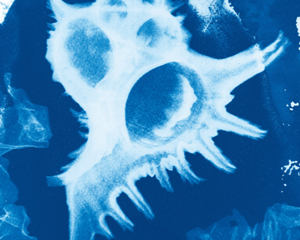While these straightforward mathematical rules account for many of the fundamental forms of seashells, a more convoluted set of interactions generates their most ostentatious features.
虽然这些简单明了的数学规则解释了贝壳的许多基本形态,但还有一组比较繁复难懂的交互作用,会产生出贝壳上最浮华招摇的特征。
Spines, knobs, and other ornaments arise from a mismatch between the growth rates of the soft-bodied mollusk's mantle and its rigid shell.
尖刺、瘤和其他装饰,都是因软体动物的外套膜和坚硬外壳生长速率不协调导致的。
This mismatch creates bulges that are exaggerated with each new layer.
每形成新的一层,这种不协调造成的凸起就会扩大。
The mantle's relative growth rate and stiffness determine the length, thickness, and curvature of these projections.
外套膜的相对生长速率和韧度,决定了这些凸出物的长度、厚度和弯曲度。
Such embellishments may initially form because of a combination of chance mutations and inescapable outcomes of the mechanical forces involved in shell growth.
一开始会形成这样的装饰,可能是因为偶然发生的突变,加上螺壳生长时牵涉到的机械力的必然结果。
If they prove advantageous to a creature's survival and reproduction, however, they may be perpetuated by natural selection, eventually becoming a prevalent trait.
然而,如果后来证明这些凸起对生存与繁衍有好处,就会在自然选择过程中保留下来,最后变成普遍的特征。
Although we primarily prize shells for their aesthetic attributes, the animals they house value them for a more pragmatic reason: protection.
尽管我们珍视贝壳的主因是美学特质,但住在壳里的动物是因为更务实的理由重视贝壳:自我保护。
About 540 million years ago, during a burst of evolutionary innovation known as the Cambrian explosion, predatory animals became much more numerous and proficient.
大约5亿4000万年前,在称为寒武纪大爆发的一波化创新期间,捕食动物数量大增,捕食技巧也更纯熟。
Soft-bodied, slow-moving organisms found themselves in constant jeopardy.
行动缓慢的软体动物时时刻刻都有危险。

Around this time, marine mollusks evolved simple but robust shells to protect their vulnerable exposed tissues.
差不多在这个时候,海洋软体动物进化出简单但结实的壳,保护暴露在外的脆弱组织。
In response, crustaceans, fish, and other predators developed more sophisticated weaponry and hunting techniques.
作为回应,甲壳类、鱼类和其他捕食者也发展出更高明的武器和狩猎技巧。
Eventually, the coevolution of predator and prey contributed to a dramatic increase in the diversity of mollusk shells.
最后,捕食者与被捕食者共同进化,促使软体动物外壳的多样性急遽增加。
Some evolved particularly large and thick shells that only the strongest or craftiest animals could crack.
有些进化出特别大又特别厚的壳,只有力气最大或最诡计多端的动物才打得破。
Narrow openings, sometimes reinforced with doors called opercula, made it more difficult for predators to reach their prey.
狭窄的壳口,有时还加上口盖,让捕食者更难抓到猎物。
Tall spires allowed some mollusks to retreat even further from danger.
高耸的螺塔让某些软体动物可以退避到更深处,以避开危险。
Spikes, spines, and knobs thwarted pincers and jaws, as did smooth and slippery surfaces.
尖刺、棘和瘤,以及平坦滑溜的表面,都能阻挠螯和大嘴。
Seashells, then, are not purely constructs of either biology or physics, nor can they be adequately described by either mathematical modeling or Darwinian theory alone.
所以,贝壳不只是生物学或物理学的纯粹建构,也无法只用数学建模或达尔文的理论充分描述。
The exacting, sculptural beauty of shells that we find so enchanting emerges from a confluence of geometry, mechanics, ecology, evolution, and luck.
贝壳令人陶醉的精雕细琢之美,源自几何、力学、生态、进化和机遇的汇聚。
Every shell you've ever scooped out of the sand or marveled at in a museum is a palimpsest layered with secrets that science is still untangling -- a physical manifestation of our planet's complexity and splendor.
从沙滩里挖出来或在博物馆里令人赞叹的每一件贝壳,都是由科学仍在努力解开的秘密层层交叠的成品--也是地球的复杂与美丽光彩具体的展现。













